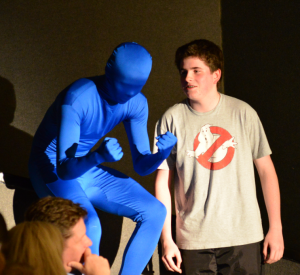As I sat down to take in my first viewing of the Jesuit Senior One Acts last Friday night, I was overcome with a sense of community. When I saw parents, friends, teachers, alumni (recent and not so recent) enter the Lecture Hall and interact with one another, it became extremely apparent that the theater participants, theater alumni, and the entire Jesuit community that supports the program have an enduring bond, which is always nice to experience.
 After I absorbed the unique atmosphere present in the Lecture Hall, I noticed the fantastically constructed, Frank Lloyd Wright-esque set, draped in shades of blue, sleek with an interesting geometric shape in the center wall. The beautiful piece of handyman work was perfect for meshing with all scenes while still standing on its own as a piece of art.
After I absorbed the unique atmosphere present in the Lecture Hall, I noticed the fantastically constructed, Frank Lloyd Wright-esque set, draped in shades of blue, sleek with an interesting geometric shape in the center wall. The beautiful piece of handyman work was perfect for meshing with all scenes while still standing on its own as a piece of art.
Finally, the lights dimmed and the introduction began. An orchestra track began to play in the auditorium that sounded like a kindergarten recital, aching the ears of everyone who listened. The odd music was followed, much to my amusement, with a sarcastic comment by the announcer, Thomas Spottiswood ’14, saying something to the effect of: “Thank you for coming to the Jesuit Spring Senior One Acts and a special thanks to the Jesuit Theater Orchestra.” The comment set the tone to what would be a series of superb performances.
The One Acts started off with the sketch of “Monty Python: Ministry of Silly Walks and Dirty Fork.” The first of the two unrelated scenes, “Ministry of Silly Walks,” caught me completely off guard, featuring a high-flying, evidently agile John Jackson ’14, playing the role of the minister. Jackson danced across the stage, leaping from place to place, stressing the importance of funding for the Ministry of Silly Walks in this day in age to Mr. Pudey, a government worker brilliantly played by Chris Ayres ’15. The performance was surprisingly delightful as it was a nice little piece of ridiculous humor.
“Ministry of Silly Walks,” caught me completely off guard, featuring a high-flying, evidently agile John Jackson ’14, playing the role of the minister. Jackson danced across the stage, leaping from place to place, stressing the importance of funding for the Ministry of Silly Walks in this day in age to Mr. Pudey, a government worker brilliantly played by Chris Ayres ’15. The performance was surprisingly delightful as it was a nice little piece of ridiculous humor.
As for the “Dirty Fork” skit, it was extremely clever. Director Griffin Miller ’13 took the small problem of a dirty fork at a restaurant and turned into such an ordeal that it drove the “fine honorable man” of Head Waiter, played by James Abbot ‘14, to death. It parodied the extremely minor problems of everyday life that people seem to make such fuss about, like a person’s phone being dead. The skit demonstrated what would happen if everyone took people’s personal problem the same way each individual person approaches their own, mocking the absurdity of such minor problems.
Up next was “Happier, With Your Mouth Open/The Line Leader/A Polite War.” “Happier, With Your Mouth Open” begins as a murder scene with two extravagant and incompetent detectives observing a body, each having their own amusing comments. Then, with a twist, the murder scene is revealed to be a movie set with a stereotypical Australian director (coincidentally played by Australian-born Matthew Gilchrist ’14) giving critiques to both characters, saying “I want you to act happier, with your mouth open,” eventually turning the detectives into sick, twisted, puppet-like characters, played by Dow Zabolio ’16 and Eric Donica ’13, who were both nonsensical and hilarious. It was a quality piece.
 “The Line Leader” depicts a fifth and third grade quarrel, each party approaching the battle for the playground as a military escapade, with a weary teacher caught in the midst of the scenario. Though this piece was solid through and through, the only part I found particularly amusing was the astonishingly brutal fight between the third grade girl and the fifth grade boy, which entailed a slap in the face, someone almost falling off the stage, and a third grade girl’s head being slammed face first into the staircase. Both the stage combat and the writing for that particular part were incredible.
“The Line Leader” depicts a fifth and third grade quarrel, each party approaching the battle for the playground as a military escapade, with a weary teacher caught in the midst of the scenario. Though this piece was solid through and through, the only part I found particularly amusing was the astonishingly brutal fight between the third grade girl and the fifth grade boy, which entailed a slap in the face, someone almost falling off the stage, and a third grade girl’s head being slammed face first into the staircase. Both the stage combat and the writing for that particular part were incredible.
The last of the three, “A Polite War,” was my personal favorite of all the One Acts. The always amusing Basil Seif ’13 played a British Colonel during the Revolutionary War leading his men into battle against the American simpletons.
The colonel and his men mock the cute Americans (who are not seen) and condescendingly explain the rules and regulations of war. As the etiquette-oriented colonel repeatedly attempts to politely reprimand the incorrigible Americans for their rule breakings, the British forces are humorously picked off one by one until only one cowardly soldier remains. Just before his death, not understanding the point of a battle, nor realizing he is losing the fight, the colonel remarked to the Americans, “You are doing very poorly.” This appropriately titled sketch is a priceless rendition of how a child imagines war, polite and fair. It was simply amazing.
Then appeared the next one act, but not on the stage, in the audience. The “Multiplex” is a unique take on personal relationships, portraying a  struggling couple with issues and a lonely peculiar man who talks to a personified chair. It is hard to do the complex one act justice in such a review, so I will make this simple. It was hilariously depressing. In one instance, the husband, after ending an argument with his somber wife, beckons “I love you,” only to be met with the darkly comical retort of “Save it!” from his wife, telling you basically everything you need to know about this sketch. As for the man sitting alone, he sat in the audience hysterically and comically shouting out to a crowd of spectators in an attempt to find a friend, occasionally expressing his heart ache to a chair, played by Gino Piamonte ‘15 in a blue morph suit. Finally, the seemingly hopeless man gains the courage, thanks to the advice of the chair, to stand up on the stage and call out for another human being to connect with. Like a kindred spirit, the downtrodden husband does the same and joins the lonely man in his bold efforts of expressing his unhappiness. By the end of the One Act, I somehow had enough optimism left in me to find this funny, which it really was.
struggling couple with issues and a lonely peculiar man who talks to a personified chair. It is hard to do the complex one act justice in such a review, so I will make this simple. It was hilariously depressing. In one instance, the husband, after ending an argument with his somber wife, beckons “I love you,” only to be met with the darkly comical retort of “Save it!” from his wife, telling you basically everything you need to know about this sketch. As for the man sitting alone, he sat in the audience hysterically and comically shouting out to a crowd of spectators in an attempt to find a friend, occasionally expressing his heart ache to a chair, played by Gino Piamonte ‘15 in a blue morph suit. Finally, the seemingly hopeless man gains the courage, thanks to the advice of the chair, to stand up on the stage and call out for another human being to connect with. Like a kindred spirit, the downtrodden husband does the same and joins the lonely man in his bold efforts of expressing his unhappiness. By the end of the One Act, I somehow had enough optimism left in me to find this funny, which it really was.
Rounding out the traditional One Acts was “The Pot Boiler,” by Alice Gerstenberg, directed by Mr. Chris Patterson ‘08. “The Pot Boiler” tells the tale of a frustrated cast, attempting to rehearse a play, fed up with their egotistical playwright, who, ironically, does not write. The scene follows the plot of what you might expect from such a sketch, characters each crazier than the next with a few points of reason juxtaposed against the insanity. The piece was nice, but one performance really awed me. The character of Mr. Ruler, played by Eric Bradley ’13, is, as the character would say, a “righteous” actor in a production plagued with flaws. Bradley’s portrayal was outrageous and witty and I would pay to see him act any time. Although it started out a little slow, the One Act did not disappoint, as my laughter constantly echoed in the Lecture Hall.
Then it was time for the finale, the first ever “Jesuit Musical Revue.” Set in a class room, the skit exhibited the life of high school students through musical renditions. The musical act hit all topics from students feeling Alone in the Universe, from Horton Hears a Who, to sharing My New Philosophy, from You’re a Good Man, Charlie Brown, two songs which I particularly enjoyed. I think the One Acts could be on to something with this new technique, but I believe it could use a little more comedy. For instance, I thought Kaitlin Reynders ’16, a Booker T. Washington student, did a fantastic job of adding some laughs in with her puppets. Ovearll, it was a great performance with some amazing voices.
During my first experience with the Senior One Acts, I was completely and utterly dumbfounded by the talent and quality of acting I saw on stage. For three years I have been attending Jesuit College Prep and never once had I gone to see a One Act. Now that I have, I am absolutely regretting that I had not gone sooner. Please learn from my mistakes and go see the Jesuit Senior One Acts next year and see a world of witty and marvelous comedy you never knew existed.
